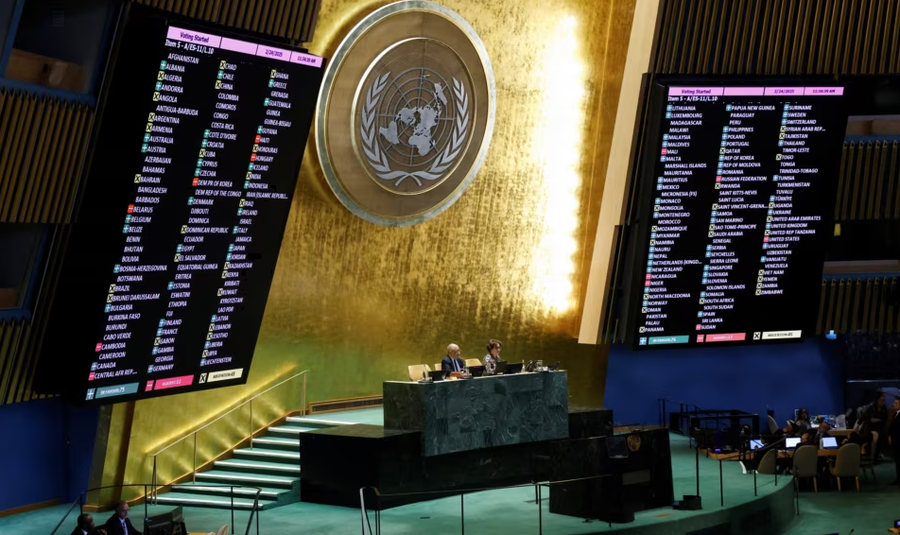
The Kremlin welcomed what it described on Tuesday as a "more balanced stance" by the United States on Ukraine, following the Security Council's approval of the US "Path to Peace" resolution, despite vocal reservations expressed by Britain and its European allies.
Kremlin spokesman Dmitry Peskov said the American stance demonstrates "a real desire to contribute to a solution."
The text of the United States resolution expresses regret for the victims "in the Russia-Ukraine conflict" and notes that the primary purpose of the United Nations "is the maintenance of international peace and security and the peaceful settlement of disputes."
It also "calls for an immediate end to the conflict and for a lasting peace between Ukraine and Russia."
"This resolution puts us on the path to peace," U.S. Ambassador to the UN Dorothy Shea told the council members. "It is a first, but crucial, step that we should all be proud of. Now we must use it to build a peaceful future for Ukraine, Russia, and the international community."
The resolution was adopted with 10 votes in favor, including Russia, China and the United States, and abstentions from Britain and four European members of the Council. No members voted against the resolution.
France and Britain tried to secure a postponement of the vote, but were unsuccessful. The two countries, along with Denmark, Greece and Slovenia, then demanded changes to the US text, including replacing the phrase "Russia-Ukraine conflict" with "the large-scale attack on Ukraine by the Russian Federation".
They were also intended to include an expression of support for the sovereignty and territorial integrity of Ukraine and support for a "just, lasting and comprehensive peace".
"While we are fully committed to peace in Ukraine, we call for a comprehensive, just and lasting peace, and certainly not for the unconditional surrender of the victim country," said France's ambassador, Nicolas de Riviere.
British Ambassador Barbara Woodward said that the terms of peace matter and that "only a just peace, which respects the terms of the UN Charter, will last."
Russia proposed two amendments, one for what it considers to be the main causes of the conflict and another for a milder formulation of the conflict.
Attempts to change the text of the US resolution failed, either due to insufficient support in the Council or due to Russian vetoes on two occasions. Washington abstained during the vote on the changes to the resolution.
The vote in the Security Council followed an earlier voting process in the General Assembly on two different draft resolutions, one submitted by Ukraine and one by the United States.
Each passed by a narrow 2/3 majority, but Washington disagreed with allies, Ukraine and the European Union, over how the conflict should be characterized, as well as its possible resolution.
In recent weeks, ahead of the General Assembly meeting, Ukrainians and Europeans circulated a draft resolution modeled after previous ones adopted by the 193-member body over the past three years.
The draft resolution included language on “Russia’s large-scale attack on Ukraine” and called for a “comprehensive, just and lasting peace” in accordance with the United Nations Charter and “within internationally recognized borders.”
Then, on Friday afternoon, the United States presented the text of its "Path to Peace" resolution.
European diplomats, caught off guard, met over the weekend to find ways to prevent the American option from undermining international support for Ukraine at a critical moment in the war.
On Monday morning, they proposed three amendments to the United States text, which were approved by the General Assembly, but ultimately rejected by the Security Council.
When the amended United States text was put to the vote, Washington abstained on its resolution. The resolution was adopted with 93 votes in favor, 8 against, and 73 abstentions.
“These amendments focus on linguistic references, not on ending the war,” said Ambassador Dorothy Shea. “The attempt to add terms undermines what we are trying to achieve with this far-reaching resolution: a strong consensus among the members of this body to come together on a resolution that calls for an end to the conflict.”
Russia also voted against the text proposed by the United States, because the Assembly rejected its attempt to interfere in the text, to add "causes of conflict" to it.
"The essence of the text has been completely distorted," said Russian Ambassador Vassily Nebenzia, but he welcomed Washington's move and said he hoped it would be followed by other initiatives.
"I believe that today, our American colleagues have seen for themselves that the path to peace in Ukraine will not be easy and that many will try their best to prevent peace from being achieved," the Russian ambassador said.
The Ukrainian and European resolution was adopted with loud applause, with 93 states voting in favor, 18 against, and 65 abstaining, but this was the weakest support Ukraine has received over the past three years in the General Assembly.
"Russia believed that Ukraine would surrender. Russia believed that we would fall in three days. Russia believed that our government would flee. However, Russia miscalculated," said Mariana Betsa, Ukraine's deputy foreign minister, adding that Ukrainians continue to be determined and resist.
In a surprise change, the United States voted against the Ukrainian text. Russia and its allies Belarus and North Korea, several African countries, EU member Hungary, and Israel also voted against.
General Assembly resolutions are not legally binding, but they have moral weight in the international community./ VOA (A2 Televizion)











